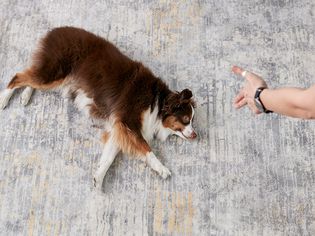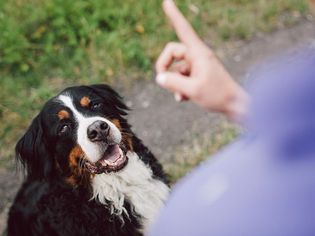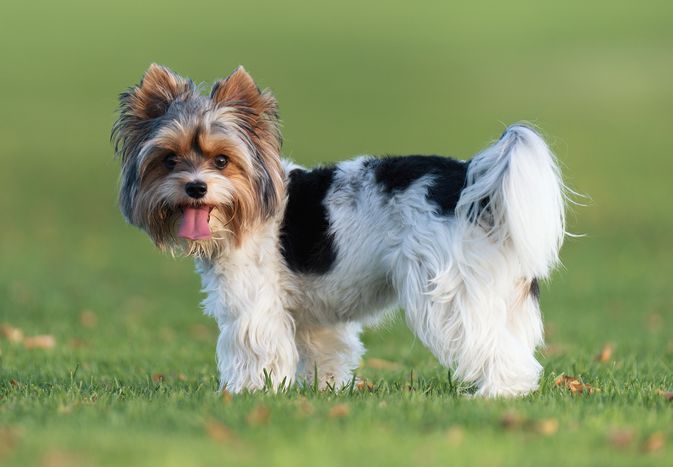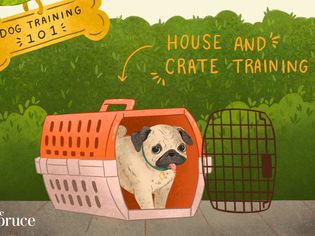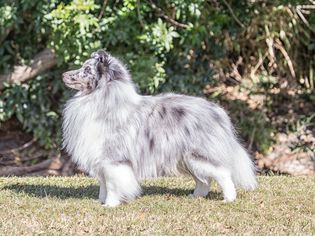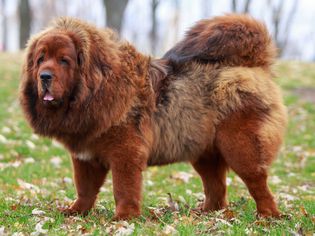The Greater Swiss Mountain Dog is a giant working dog breed from Switzerland with a short, tricolor double coat and typically a white blaze running down the center of its face. Despite the breed's majestic and imposing size, these dogs are gentle giants. They are very in tune with their owners and can make great family pets. They love being busy and having jobs to do. And their friendliness, trainability, and strength have led to their success as therapy animals and search-and-rescue dogs.
Breed Overview
GROUP: Working
HEIGHT: 23.7 to 27 inches (female), 25.5 to 28.5 inches (male)
WEIGHT: 85 to 110 pounds (female), 115 to 140 pounds (male)
COAT: Short, smooth
COAT COLOR: Black, red, and white
LIFE SPAN: 8 to 11 years
TEMPERAMENT: Loyal, affectionate, companionable
HYPOALLERGENIC: No
ORIGIN: Switzerland
Characteristics of the Greater Swiss Mountain Dog
Greater Swiss mountain dogs generally have very people-friendly personalities. Their affectionate temperaments allow them to get along with kids and even strangers. At the same time, they also can be good watchdogs. While they don't usually bark excessively, they will alert you to something they find unusual or threatening.
| Affection Level | High |
| Friendliness | High |
| Kid-Friendly | High |
| Pet-Friendly | Medium |
| Exercise Needs | Medium |
| Playfulness | High |
| Energy Level | Medium |
| Trainability | High |
| Intelligence | High |
| Tendency to Bark | Medium |
| Amount of Shedding | Medium |
History of the Greater Swiss Mountain Dog
The Greater Swiss mountain dog developed in the Swiss Alps. It’s theorized that it descended from the breeding of native dogs and mastiff-type dogs that were brought to the area when the Romans invaded Switzerland in 58 B.C.
As industrialization grew and farmers ceased to rely on working dogs, the Greater Swiss mountain dog breed nearly disappeared. However, in the early 1900s people began to take an interest in them again, and a breed club formed.
These powerful and hard-working dogs helped out with hauling heavy loads during World War II. And finally they made their way to the United States in the mid-1900s. The American Kennel Club first recognized the breed in 1995, and it still remains relatively rare.
Greater Swiss Mountain Dog Care
Greater Swiss mountain dogs only need a moderate amount of activity to exercise their big bodies. And it's imperative to make sure they're properly trained and socialized to keep their size and power in check. Fortunately, grooming is fairly simple for them in spite of their size.
Exercise
Although they are athletic dogs, Great Swiss mountain dogs don’t require an enormous amount of exercise. Plan about an hour per day of physical activity, including walks, hikes, and games of fetch. If you’re looking for a dog to be a long-distance running partner, this likely isn’t the breed for you.
Note that this dog has good resistance to the cold, thanks to its thick double coat. But it can be sensitive to hot weather. So keep outdoor sessions in the heat brief.
Grooming
This breed’s coat is fairly low-maintenance. Plan to brush weekly to remove loose fur. And expect higher periods of shedding usually twice a year in the spring and fall. At that time, you’ll want to do more frequent and thorough brushings to capture all the loose fur.
Baths are necessary roughly every month, depending on how dirty your dog gets. And check to see whether your dog needs a nail trim on a monthly basis as well. Also, look in your dog’s ears at least weekly for wax buildup, dirt, and irritation. And attempt to brush its teeth daily.
Training
Begin training and socializing your Greater Swiss mountain dog from the moment you get them. These dogs can be difficult to manage as fully grown adults if they’re poorly socialized.
Luckily, these dogs are typically very in tune with their humans and eager to please. They respond well to positive training methods and are especially food-motivated. But they can have a stubborn streak as well. So it’s important to be very consistent and patient with your training to prevent bad habits from forming.
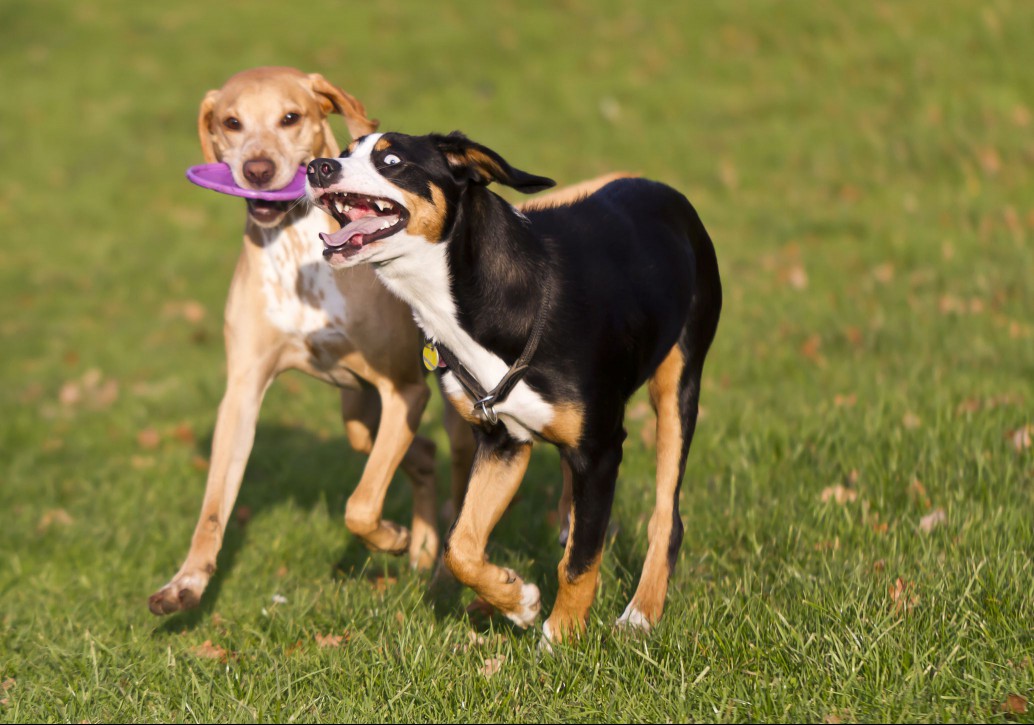
Common Health Problems
The Greater Swiss mountain dog doesn’t have any breed-specific health issues and tends to be very healthy throughout its life. But it can experience the same issues as other large breeds. They include:
- Orthopedic problems
- Splenic torsion
- Bloat
- Urinary incontinence (in puppies and spayed females)
- Epilepsy
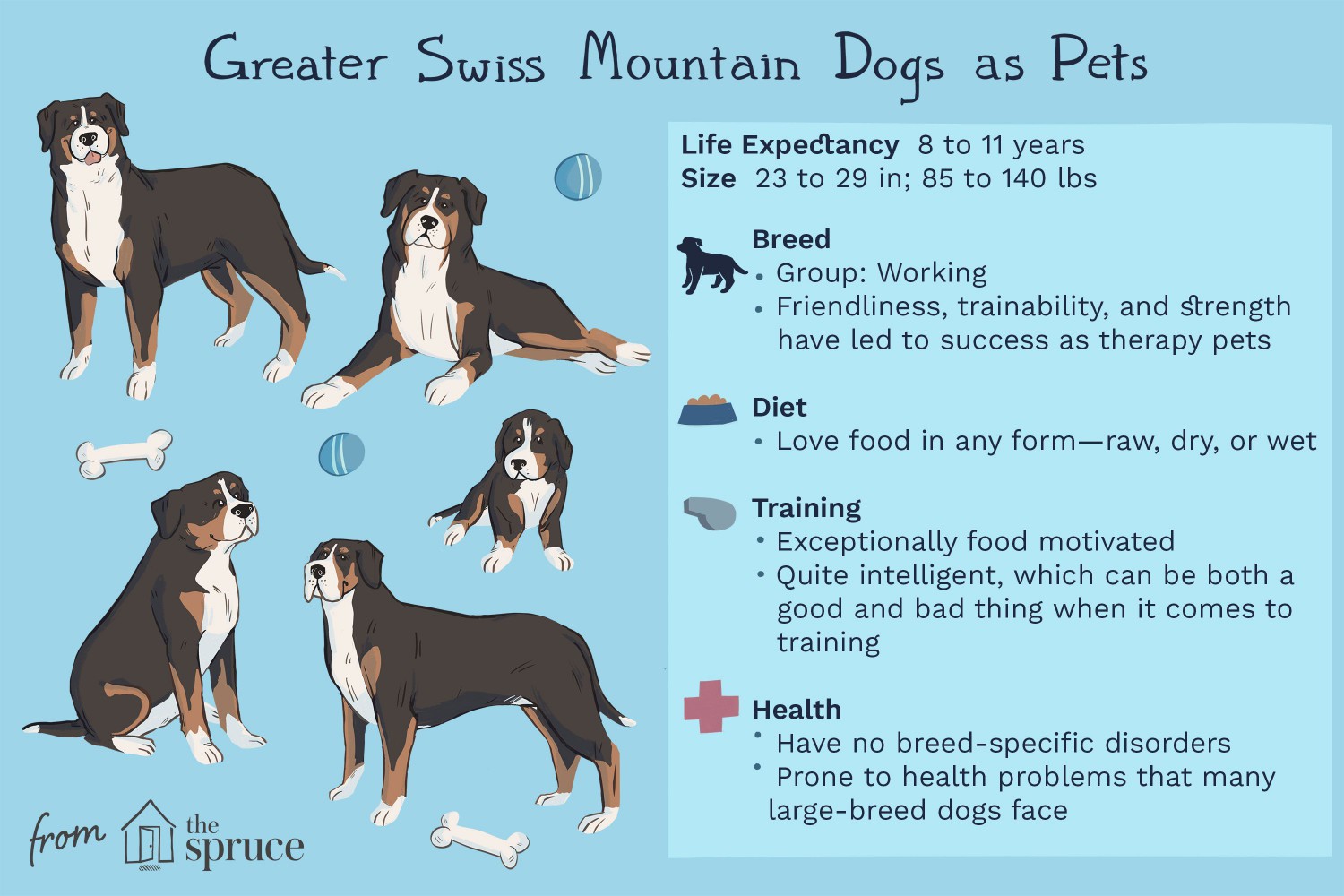
The Spruce / Emilie Dunphy
Diet and Nutrition
Always have fresh water available for your dog. And feed a quality, nutritionally balanced canine diet. It’s common to feed two measured meals per day. But discuss the type of diet and the amount with your vet to make sure you’re meeting the needs of this breed. Likewise, be mindful of treats and other snacks. Excess weight can put a lot of stress on the joints of this big dog.
Where to Adopt or Buy a Greater Swiss Mountain Dog
Greater Swiss mountain dogs are not incredibly common, but it’s still worth checking local shelters for a dog in need of a home. Also, see whether there are breed-specific rescue groups in your area. If you’re looking for a reputable breeder puppy, expect to pay around $1,500 to $3,000, though this can vary widely depending on bloodline and other factors.
For further information to connect you with a Greater Swiss mountain dog, check out:
- Greater Swiss Mountain Dog Club of America
- Greater Swiss Mountain Dog Rescue Foundation
- American Kennel Club Marketplace
Greater Swiss Mountain Dog Overview
Loving and loyal
Can be good with kids
Can excel in therapy and other canine jobs
Doesn't tolerate heat well
Can be boisterous, especially when young
Can be stubborn about training
More Dog Breeds and Further Research
Before deciding on a Greater Swiss mountain dog, do plenty of research first. Talk to vets, breed owners, rescue groups, and reputable breeders. Try to spend some time with the breed if possible.
If you’re interested in similar breeds, check out:
- Bernese mountain dog
- Saint Bernard
- Great Pyrenees
There’s a whole world of potential dog breeds out there—with a little research, you can find the right one to bring home!
- What’s the difference between Greater Swiss mountain dogs and Bernese mountain dogs?
Greater Swiss and Bernese mountain dogs look similar and are related. However, Greater Swiss mountain dogs are significantly larger with a much shorter coat.
Are Greater Swiss mountain dogs good family dogs?Greater Swiss mountain dogs can make excellent family pets, as long as they have proper training and socialization. They are typically patient with and even protective of children, though it’s important always to supervise a dog around young children.
Are Greater Swiss mountain dogs aggressive?Greater Swiss mountain dogs generally do not have an aggressive nature. They are often good watchdogs, barking at perceived threats. But they are not prone to biting.

